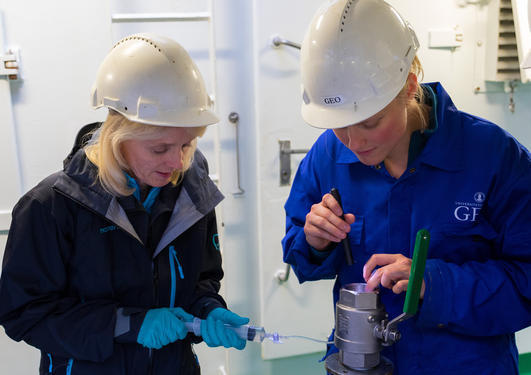Why study geochemistry and geobiology?
Main content
Are you interested in studying interactions between geological and biological processes on Earth? Do you want to know more about what happened with our planet when life evolved? Are you curious about the geochemical processes happening deep in the mantle and the chemical reactions leading to the formation of ore deposits on the seafloor? And do you want to combine marine research cruises and on-land fieldwork with research in the laboratory using state-of-the-art analytical instruments?
Then you should apply for a Master in Geochemistry and Geobiology at the University of Bergen! Read here how to do this.
Our research group welcomes students that are interested in the interactions between magmatic, metamorphic, hydrothermal, geochemical and biological processes in modern and ancient geological time. We study a wide range of environments, from marine sediments to high-temperature hydrothermal vents fluids and from the earliest habitats for life on Earth to the deep biosphere. Our toolbox contains techniques such as stable and radiogenic isotopes, time-series analyses, molecular microbiology, major and trace element analyses, organic geochemistry, statistical correlation analyses as well as classical mineralogy and petrography.
What can you do with a MSc in Geochemistry and Geobiology?
As a geochemist or geobiologist, you can use your expertise to study big scientific questions such as 'How did life evolve on Earth?' and 'What is at the bottom of our oceans?'. Your interdisciplinary background is valuable in applied research projects and you will often work in close collaboration with other geoscientists, biologists and chemists on societal relevant questions such as 'Can we develop new medicines from microbes at hydrothermal vents?' or 'Can we find enough copper on the seafloor for future demands?'.
In addition to academic research positions, you can work in exploration and search for natural resources (mineral deposits, oil, gas) or as a consultant addressing environmental issues such as toxic waste sites. With a background in analytical work, you may also be employed in a chemical laboratory or become a lab manager. If you like to educate, you can also use your knowledge on geochemistry and geology to become a high-school teacher in chemistry or geoscience.
Read here about where some of our former MSc students ended up.
